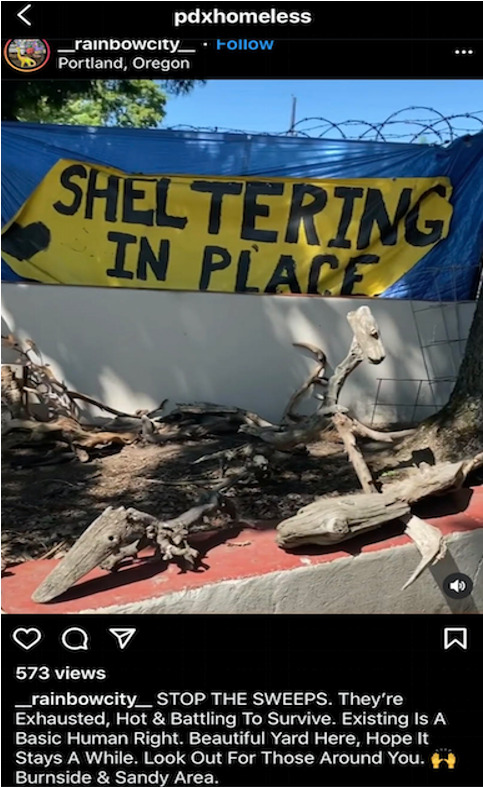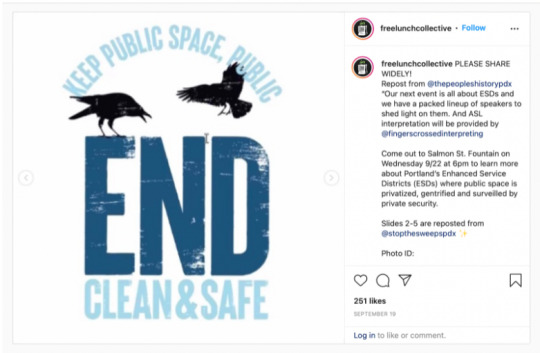Portland State University - UNST 242: Leading Social Change (Fall 2021) Hailey M., Lindsay M., Lani M.-A., and Emma M.
Don't wanna be here? Send us removal request.
Photo

Controversy with Civility- there are varying perspectives with this social issues that root from two clear sides, liberal and conservative. These perspectives are inevitable to avoid because they are very different and strong opinions. To move forward with social change such controversy has to be understood and civilly aired openly.
https://www.instagram.com/p/CR45lDGhnMo/?utm_medium=copy_link
0 notes
Photo

Collaboration in protest for social change. Ending sweeps which are bad practice in “cleaning up” the city.
https://www.instagram.com/p/CUA7QHvPizY/?utm_medium=copy_link
0 notes
Link
This tweet by SELAH Neighborhood Homeless Coalition is a great example of Collaboration by sharing ownership towards a common purpose through the creation and shared awareness of their petition for the city of Seattle to put a dumpster in a local unhouse campsite to help improve the sanitation and safety of their environment.
https://twitter.com/selahnhc/status/1462972383988527106
0 notes
Text
Contested Development: Homeless Property, Police Reform, and Resistance in Skid Row, LA
Our group, @yourfriendlypdxneighbors focuses on the tensions between housed and unhoused residents. This has been an ongoing problem due to the lack of sanitation and waste services that affects the safety of residents. In the article, “Contested Development: Homeless Property, Police Reform, and Resistance in Skid Row, LA” Doizer informs us of a different perspective of the houseless properties. Their thought on this problem was to simply remove and destroy the property of the unhoused. It is clear that the lack of the city’s due process is inequitable. “City attorney Ms. Wendy Shapero, however, correlates homeless belongings with being indistinguishable from trash and, furthermore, that homeless property poses health and safety hazards.” (Doizer, 2019). It is clear how understandable the conditions are putting on the community’s safety and health concerns. They define this problem by looking to a larger strategy by pointing to health and safety risk. The city stopped cleaning sidewalks, picking up trash and maintaining public restrooms. Furthermore, trash buildup was a result of overcrowding houseless residents and the lack of responsibility they have. This point is often agreed upon when talking about the health and safety concerns the houseless residents create in their communities.
APA Citation:
Dozier, D. (2019). Contested Development: Homeless Property, Police Reform, and Resistance in Skid Row, LA. International Journal of Urban and Regional Research, 43(1), 179–194. https://doi.org/10.1111/1468-2427.12724
0 notes
Text
“This is My Community”: Reproducing and Resisting Boundaries of Exclusion in Contested Public Spaces
When listening to the complaints of housed community members, it is clear that their concern for safety and sanitation are contributing factors to the tension that exists between both housed and unhoused neighbors. Our group chose to focus on sanitation and waste services as a problem contributing to the tension between neighbors while Toolis and Hammack in their article, “‘This is My Community’: Reproducing and Resisting Boundaries of Exclusion in Contested Public Spaces,” focused largely on housed neighbor’s concern for safety, a problem contributing to the tension between neighbors. The authors made a point that oftentimes the issue of garbage and waste produced by houseless neighbors are frequently reframed as an issue of safety (or risk to public health). Toolis and Hammack stated that, “disruptive behaviors and flagrant disposal of human waste, illegal trash and hypodermic syringes, oftentimes symptoms of substance abuse and mental illness, are a major public health concern and exacerbate fear of crime in Santa Cruz.”
This article makes a clear case for how concerns for safety among housed neighbors makes criminalizing houselessness bureaucratically easy; where @yourfriendlypdxneighbors focuses more on the dehumanization of houseless neighbors (and therefore lack of sympathy, services, and resources) as a result of tension over waste. With houselessness as a multifaceted problem it’s clear from this article that there are many contributing factors to the tension between housed and unhoused neighbors. Despite not seeming to focus on issues of waste as a contributing factor to overall tension between neighbors, it seems that most experts would agree that the issue of garbage and waste caused by houseless neighbors is definitely a contributing factor (Toolis & Hammack, 2015).
APA Citation:
Toolis, E., & Hammack, P. (2015). “This is My Community”: Reproducing and Resisting Boundaries of Exclusion in Contested Public Spaces. American Journal of Community Psychology, 56, 368–382. Retrieved November 28, 2021, from https://link-springer-com.proxy.lib.pdx.edu/article/10.1007/s10464-015-9756-5#citeas
0 notes
Link
KOIN 6 News covers a 2019 audit where it was made clear that the city’s “Homeless Camp Cleanup Program needs better management”. One main critique being the need for better communication. It was also reported that campsite residents are unaware of when “cleanups” will take place, and where to retrieve their confiscated property (KOIN 6, 2019).
APA Citation:
KOIN 6 [KOIN 6].(2019, March 20). Audit: Homeless cleanups need better management. YouTube. https://www.youtube.com/watch?v=OS-MD117bzo
0 notes
Link
Sean Reynolds, in Seattle Real Estate Podcast, goes over a recent incident where the City of Seattle requested that a local volunteer group, We Heart Seattle, stop their efforts to support their local unhouse neighbors and quit picking up garbage in city parks. This group of Northwest Seattle residents started working together last year and have already collected “more than 320,000 pounds of garbage”. The city even sent them a Cease and Desist Order! They were advised that their efforts were found to be disruptive to other organizations’ and the City’s efforts to resolve the “homeless epidemic”. One particularly productive day in October of this year was mentioned when it was noted that the members of We Heart Seattle were supported and aided in clearing discarded waste by the residents of the camp they were working at. Reynolds found the City’s desire to stop these volunteers’ efforts to be baffling and unproductive for not only the unhouse residents and the community, but also for the local government (Reynolds, 2021).
APA Citation:
Reynolds, S. (Host). (2021, November 12). The City of Seattle Tells Volunteer Group to Stop Helping the Homeless Due to Being Disruptive (No. 831) [Audio podcast episode]. In Seattle Real Estate Podcast. Summit Properties NW. https://open.spotify.com/show/0gSxJTxsmFJ8iq4fvCXECX?si=swskuhAIQTa6jAoLal2uhQ&nd=1
0 notes
Link
“We just want to break chains like slaves in the south.” Give ‘er a listen! Song about protesting for social change that was made during the height of the 2020 BLM protests across America. Truly captured the moment and movement when America arguably saw the most change regarding racial tensions since the 60′s.
Paak, A. (2020). Anderson .Paak - Lockdown [YouTube Video]. In YouTube. https://www.youtube.com/watch?v=TgItkJCm09c
0 notes
Link
APA Citation:
Iboshi, K. (2021, September 1). Impact of a single homeless camp: $18,347 in cleanup,1,000+ complaints, endless conflict. KGW8 INVESTIGATIONS. https://www.kgw.com/article/news/investigations/the-impact-of-a-single-homless-camp-portland/283-b7076cc9-e694-4893-8141-38852830f739
0 notes
Link
APA Citation:
Collins, V. (2021, May 23). Proposed homeless camp in church parking lot unsettles progressive Denver neighborhood. NBC NEWS. https://www.nbcnews.com/news/us-news/proposed-homeless-camp-church-parking-lot-unsettles-progressive-denver-neighborhood-n1267181
0 notes
Photo

Stakeholders and Leaders
Interviewee:
Brice Ehmig, a previous fellow for Oregon Metro in the Waste Prevention and Environmental Services department. She is currently a student at PCC in the Urban Studies department focusing on Primary Planning. She also has a Masters in Public Administration.
Who has a stake or interest in this problem?
“People who have stake or interest in this problem would be neighborhood associations, especially if they have an established HOA (Homeowners Association). And on the other end of that would be the advocacy organizations for our houseless neighbors, such as Right to Dream, and there are a lot of [organizations]. The neighbors themselves, the homeowners, as is the nature of private property. The city if they own any of the right of ways that people are camping on. Like in the case of the Spring Water Corridor, Metro would be involved, or the city, or the neighborhood.”
Would dumpsters ever be built into the garbage route by state or city government near houseless camps?
“It might be, but I think that since the solid waste system is based on rate payers, which comes out of your property taxes, I believe, it’s a little hard to organize around non-rate payer areas. So it couldn’t just be a random dumpster. I think sometimes they do put out dumpsters but it’s usually around [camp] sweeps, which is not beneficial to the people who are camping. But they usually put out dumpsters when they are going to clear the camps. I also think that when they put out dumpsters for cleaning or any extended amount of time the [housed] neighbors get upset about that too. Because [housed] neighbors ultimately just want them gone. Because adding features to their neighborhood to benefit the houseless people that is not politically viable for homeowners. It’s very difficult.”
What are their positions or views of the problem?
“I think that things like [Metro’s] bag program for cleaning up houseless camps, and self-directed [and] self-governed houseless camps are important for the stability for the people in them. And having the autonomy in what essentially is their own neighborhood association is important. And so I think things that are imposed on them that change either the makeup of the group of houseless people, or interrupt some sort of way that they go about cleaning is not helpful and can be destabilizing. Or [it] can cause tension between the [housed] neighbors and the houseless neighbors.”
Using the [Metro’s] bag program where would a houseless person get a bag in the first place?
“In Metro there are Waste Prevention and Environmental Services, and then there is a department within that specifically for dealing with houseless camps and waste. And I think they go out and they hand out bags. They are relaying on anyone who sees the bag to call the number and then they go around with a truck. So that is kind of like the unofficial garbage pickup for houseless people but it still goes back to the thing where it’s up to the people who are supposedly [liaisons] to get the garbage collected.”
How are these stakeholders impacted differently by this problem?
“[Houseless people] have an entire community to maintain and they are doing it with significantly less resources than the people who are in homes have. They are doing it without waste services, they are doing it without private property, or protection. There is just no way to equate the struggles of the houseless people and the house people in an area. You’re dealing with completely different systems. And anything that disrupts homeownership would be maybe mild but then that same disruption to a houseless population could completely tear apart the community. Which leads to destabilization, which leads to actual safety concerns. It’s a matter of framing this issue within all of its context for people and being able to have proper advocacy on the side of the houseless neighbors. The stakeholder for houselessness and the organizations that are working for advocacy, like Right to Dream, they are impacted by this because they have to allocate resources to deal with this and it is a lot easier to do if there is more organized groups of houseless people rather than having to deal with different issues in several different neighborhoods across the city, across the metro region. It’s hard to do. And there are multiple sorts of organization but then you run into issues of consistent planning and consistent advocacy. So it is a lot of reactive planning but also about meeting the sense of urgency for people who are experiencing homelessness. It’s a lot of balancing.”
APA Citation:
B. Ehmig, personal communication, October 30, 2021.
0 notes
Text
Environment and Context
There are currently many programs run by both local government and community members working to tackle this problem, but the two we would like to highlight today are the Metro’s Bag Program and Ground Score. Metro’s Bag Program was created in 2018 “The bags are imprinted with Metro’s website and phone number. ” (Metro's bag program, 2021). In 2019 “Ground Score [had] been awarded funding from the regional government Metro for training, administration and outreach. As of the 2019 article the unhoused employees of Ground Score were being “paid $15 an hour for 4½ hours a week as part of HAP’s pilot program.” (Hill, 2019).
The issue of waste removal and the tension it causes between neighbors has led to inhumane practices, like camp sweeps, and unhealthy living environments for all community members. Local government and community members on both sides of the fence have been focusing on this issue for many years now and although there has been a marked increase in programs to combat this issue we still find ourselves without a functional system that leaves everyone feeling safe and cared for.
0 notes
Text
Portland man battles homelessness through trash collection
"This is what happens when we sit around and wait," says Moses. "And this is the effect on the city for sitting around and waiting."
https://katu.com/news/homeless-crisis/portland-man-battles-homelessness-through-trash-collection
0 notes
Text
Rose City Resource
“Street Roots is the publisher of the Rose City Resource, the most comprehensive list of services for people experiencing homelessness and poverty in Clackamas, Multnomah and Washington counties.”
https://www.streetroots.org/rose-city-resource
0 notes
Text
Looking to reduce tension between the housed and unhoused members of our community due to the lack of waste disposal services for the unhoused.
1 note
·
View note